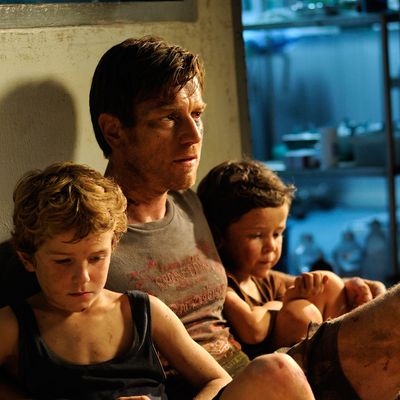
Does any modern screen actress suffer physical agony as compellingly as Naomi Watts? Film after film, directors want to put her through the grinder — tormenting her with giant apes in King Kong, or with psycho home invaders in Funny Games. Once the action gets going in The Impossible — Juan-Antonio Bayona’s film about a family who survived the 2004 Indian Ocean tsunami that devastated a giant chunk of Southeast Asia — it’s hard to tear our eyes away from her, even as the story continues to tear bits and pieces of flesh and bone off her. She cries, she screams, she limps, she passes out, she goes practically purple, and all we want to do is jump into the movie and save her. I’m not sure any other actress today could have pulled this off without seeming cheap or manipulative.
The same, unfortunately, cannot be said for the movie itself, which often traffics in the manipulative. Although it’s ostensibly based on true events, The Impossible is not so much an inspiring tale of survival as it is an action flick. The only difference is that the climactic set piece happens early on — not long after we’re introduced to the Bennet family, who are traveling to Thailand for Christmas (in an airplane that blasts its way into the frame of the opening shot as if it’s about to be taken over by terrorists or something). Even the clunky expository dialogue between the family members — standard issue mom-and-pop-droning-on-about-work and brothers-not-getting-along stuff — can be kinda sorta justified as the necessary byproducts of paint-by-numbers action movie setup. (As mom and dad, Watts and Ewan McGregor seem a little clunky around each other, but no matter, they’re not together for most of the movie.) Then the giant wave comes, separates the family, tears a giant hole in Naomi’s leg, and we’re off to the races, as they say.
Bayona’s previous film was the creepy 2007 horror film The Orphanage, and the guy knows a thing or two about putting together a scene. The Impossible is extremely well-directed, in a sense — the tsunami sequences are powerful, the scenes of mom and her elder son (an excellent and touching newcomer named Tom Holland) trying to find help amid the devastation are suspenseful. But there’s something unseemly about this expertise, too, as if we’re missing some crucial human element. One late set piece actually has the various members of the family repeatedly missing each other in a hospital, like some Marx Brothers gag. That the hospital is filled with suffering Thais and others who probably aren’t ever going to see their loved ones again seems like an afterthought.
This is a criticism that gets dusted off every once in a while, and I take no pleasure in rolling it out once more. While it certainly is remarkable that this family made it through this awful disaster intact, this was, let us not forget, a near-Biblical catastrophe that claimed 230,000 souls. That we’re being given a pulse-pounding, happy-ending movie about a white family that survived while scores of Asians died (horribly), seems somewhat tactless at best. Here it’s a little even more troubling, because the Thais genuinely do seem relegated to the background, aside from a couple of nice doctors and some vaguely other-ish villagers who help the family out briefly. The other survivors the Bennets interact with are exclusively European. Perhaps it’s just a circumstance of the fact that they’re tourists, and they’re talking to other foreigners who are feeling out of place in this strange land. And it’s not like tokenism is ever the solution. But the fact is that more than 8,000 Thais died in that tsunami. The way the suffering of the Bennets and of those around them is portrayed makes you question the entire premise of the film.
By the way, the original family wasn’t even British; the end credits reveal that they were, in fact, Spanish, lending the whole enterprise an additionally unsavory musk of corporate interference. (It’s possible that they’ve dubbed them and changed their names for the Spanish version, as the filmmakers are also from Spain.) For all the technical expertise and generally fine acting displayed in The Impossible, I think I could smell the executives’ cigars as the end credits rolled.


